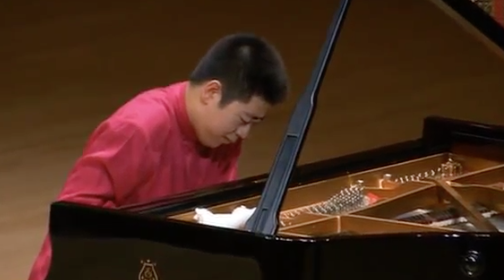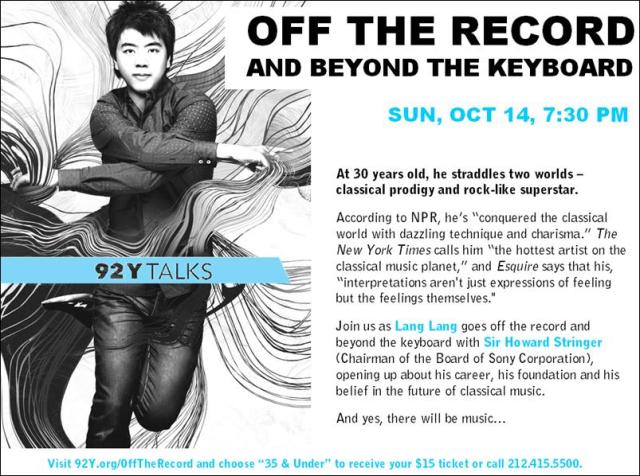
World-renowned pianist, Lang Lang has attained rock star status in China, whereas here in the U.S., a sizable contingent of serious mentors in and out of the conservatory milieu register outright disdain for him. Many detractors publicly post their objections to LL’s approach to music-making, citing his exaggerations, flamboyance, extraneous gestures, and erratic performances in their total renunciation. (Add in a commercialized packaging that offends many who would prefer music to be a purist, Art for Art’s sake undertaking.)
A recent FACEBOOK posting of a BAD review generated through the London press, drew a cathartic sigh of relief among LL critics, as if the “chickens had finally come home to roost.”
EXCERPT:
“Lang Lang was at the Festival Hall to play Mozart’s Piano Concerto No. 24 in C minor, K 491, a surprising choice of composer for a musician more used to bringing his show-off brand to the warhorse Romantic concertos. Yet he got off to a good start, producing a beautiful crystalline tone and a focused musical line.
“That impression didn’t last long: he quickly reverted to his attention-seeking mannerisms, miming tai chi between the piano’s entries and flirting with the front row like a wannabe pop star.”
The balance of the review careens downhill as rapidly as a motorcycle out of control!
***
Amidst a whir of PR surrounding a pianist who has ignited interest in the piano among the Chinese youth; who has played in the Olympic spotlight with flashing, multicolored beams, and who’s been the star attraction at the Queens Jubilee concert, any criticism of the pianist and his career choices should be weighed and measured accordingly.
Seymour Bernstein’s comments about the pianist form a category that epitomize the essence of anti-Lang Lang sentiment.
A pianist, teacher, composer, NYU faculty member, and celebrated author of WITH YOUR OWN TWO HANDS, Seymour forwarded a copy of his letter to Marilyn C. Nonken, NYU administrator, after she had announced ticket availability for “A Conversation with Lang Lang,” taking place at the 92nd Street Y. (2012)
Nonken’s note to NYU students and faculty bearing an attached flyer, read as follows:
“Every so often we put on an event that goes down in history… a conversation on stage where audiences get a rare glimpse into the mind of a person who is currently shaping our world. Our October 14th event falls into this category because we are bringing Lang Lang on our stage to offer music lovers a once-in-a-lifetime opportunity to learn about him as a person… how he thinks, how he works, and what moves him.”
Bernstein’s personal response was immediate before he drafted a substantial email to NYU principles.
“To be blunt about it, this outraged me!”
He subsequently forwarded what he’d sent to Dr. Nonken, and Robert Howe, Ph.D., Chair of NYU’s Dept of Music/Performing Arts Professions:
“Marilyn, I see that this notice is signed “Holly,” and also has Robert Howe’s name attached to it. Do they, and the SONY Corp. actually think that Lang Lang is “shaping the world?” The bazaar photo of him with the banner “92Y TALKS” across it, bespeaks the antithesis of true art. I spend a lot of time with my serious students and colleagues discussing the pros and cons of Lang Lang’s playing and his subsequent success…
“He is, of course, a formidable pianist. And I have heard him play gorgeously at the early stage of his career, his absurd physical movements on stage, notwithstanding. But in my opinion, he has fallen from grace, so to speak, and caters now to audiences with vulgar tastes, as do certain rock stars. As such, I feel that the course he has chosen in his career is to be avoided, and not emulated.
“What in fact can our students learn from such a virtuoso who places glitter, speed, and extroversion above the essence of what we have come to believe is musical art?”
As an antidote to these criticisms, Lang Lang cites the support of musical notables, Daniel Barenboim, Christoph Eschenbach and his Curtis teacher, Gary Graffman.
Barenboim: “He has extraordinary facility, and very unusual sensitivity to harmonic and mood changes.”
Graffman: “I knew immediately that he was a major talent, (at the age of 14) and was happy to have worked with him for five years.”
Graffman’s study with Vladimir Horowitz filtered into lessons with Lang Lang, as he focused on the singing tone and taught the youngster how the vocalist’s breath was central to expressive music-making. (one can easily hear Lang Lang’s well-synchronized breathing into fluid phrases)
Eschenbach remembered hearing Lang Lang in a gathering arranged by Graffman.
“From the first note, I was fascinated… I felt immensely moved that a 17-year old could have such deep insight into the center of the music and what the music wanted to say.” (Rada Bukhman, pianist, teacher, and author, Discovering Color Behind the Keys: The Essence of the Russian School of Piano Playing, heard Lang Lang perform at this very life juncture. “I was very impressed, he was absolutely natural…the music flowed from his heart)”
As to the dating of these superlatives, perhaps they would more aptly frame Lang Lang’s Carnegie Hall debut held back in 2003.
As validation of an array of kudos, LL’s Liebestraum filled the space with relentless swells of beauty.
In retrospect, many may ask, was this the voice of the pianist’s seasoned past, not wholly brought fruitfully into the present?
I offer two comparisons of the same work played by Lang Lang and the late Arthur Rubinstein:
The Chopin Grande Polonaise Brilliante
Initially, I was taken by LL’s “crystalline” tone that the London critic, John Allison, had fleshed out in his review, but after expanding my horizons with a serving of Rubinstein’s performance, my opinions were a tad altered. (Don’t misunderstand, I think Lang Lang has electrifying energy, a gorgeous sound, technique in bundles to spare, enthusiasm, sometimes over the top, as with some of the ultra FFF attacks in the Chopin Grande Polonaise Brilliante, but he can quickly offset these with a pure, velvety singing tone, making big mood shifts that are very seductive, but sometimes incongruous and jarring.)
The Liszt encore (Consolation No. 3) offered by Lang Lang seemed to be more consistently balanced, redeeming him. It evoked the pianist who introduced himself in a different mode (1973), one I would dote on when it applied.
Rubinstein:
Finally, in his defense, many Lang Lang fans the world over will credit him with being a global ambassador for piano study. Look how many Chinese kids are taking piano now under his influence, and how piano manufacturing is booming in the pianist’s home country! For this alone, we owe Lang Lang a big dose of appreciation!
But will his enthusiasm filter down to American kids who are journeying afar from Classical music by their habituation to Rap and Pop through Mp3’s and 4’s at loud, ear-piercing electronically channeled levels!
Regardless, LL detractors will prefer to place music study above the fray, granting it an almost “elitist” status.
from Arioso7's Blog (Shirley Kirsten)
https://arioso7.wordpress.com/2015/12/05/the-lang-lang-controversy/

No comments:
Post a Comment